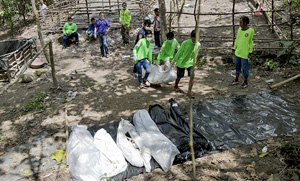Kuala Lumpur, May 24: Malaysia today said it has found mass graves, feared to contain bodies of Bangladeshi and Rohingya migrants from Myanmar, near detention camps used by human traffickers on the border with Thailand, weeks after its police unearthed several bodies from similar shallow graves.
The mass graves were found near 17 abandoned camps in Padang Besar area on the Thai side of the border and they are believed to be a part of human-trafficking activities involving migrants, Home Minister Zahid Hamidi said.
The Minister said the General Operations Force (GOF) had found 14 large tents and three other smaller tents, believed to have been operational for at least five years but were abandoned when the authorities came to the location.
"Today, the inspector-general of police (IGP) and his deputy are at the Malaysia-Thailand border for identification and confirmation. The graves were identified as those for the refugees in the human trafficking trade. Probably, one grave has maybe three, four bodies or maybe only one. So we are counting at the moment," he said.
As governments in Thailand, Malaysia and Indonesia have launched crackdowns amid intensified international spotlight, human traffickers have abandoned camps on land and even boats at sea to avoid arrest.
In many instances, these traffickers have been paid by the miniority Rohingya Muslims from Myanmar to help them flee to Malaysia or Indonesia.
The traffickers reportedly held them to ransom in the jungle camps demanding more money and in many cases leaving them to die quickly burying them in mass graves.
A few weeks ago hundreds of Muslim Rohingyas were found crammed in boats heading to Malaysia and Indonesia.
Human rights groups and activists say the area on the Thai-Malaysia border has been used for years to smuggle migrants and refugees, including Rohingya Muslims, a persecuted minority in Myanmar.
Since May 10 alone, more than 3,600 people - about half of them from Bangladesh and half Rohingyas from Myanmar - have landed ashore in Indonesia, Malaysia and Thailand.
Thousands more are believed to be trapped at sea in boats abandoned by their captains.
Mass graves were discovered in Thailand earlier this month mostly in southern Songkla province bordering Malaysia.
The Rohingya, numbering around 1.3 million in Myanmar, are believed to be one of the most persecuted minorities in the world.





Comments
Add new comment